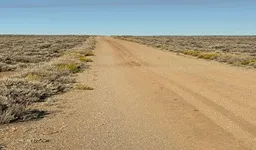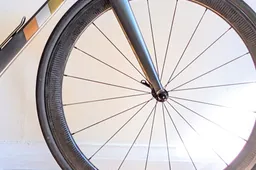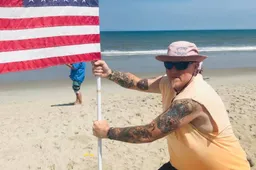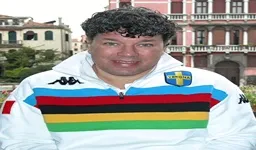Jumbo-Visma played vital role in decisions following "life-threatening" team time trial second Vuelta stage
Cycling
Jumbo-Visma played a pivotal role on Sunday morning in the final decision to record the classification times in the second stage of the Vuelta, positioned at nine kilometers from the finish line. In IDLProCycling.com, we visited their bus just before the start and had a conversation with team leader Marc Reef.
During the interview, the course of events remained uncertain. Initially, the Vuelta organizers had opted to record times at the top of Barcelona's Montjuïc, located just over three kilometers from the original finish line. However, this solution didn't satisfy many teams. As rumors of ongoing negotiations circulated, we made a stop at the Jumbo-Visma bus.
Hi Marc, did the adrenaline drop quite quickly last night?
"Yes, although at the moment, the adrenaline is also present in anticipation of what will happen today."
Yes, I understand that various scenarios are being discussed since not everyone is satisfied with the plan to have the finish for classification riders on the final climb...
"Exactly, because in the end, it doesn't make a significant difference. You still have the bonus seconds at the top and the finish line, so teams will keep pushing. We're looking for a solution that works for everyone. We recognize the importance of the organization and the significance of Barcelona. They invest in this race, and we also have a stake in it, which is the safety of the riders. Given the current conditions, that can be quite challenging."
Now, twenty minutes before the start, is there still no decision?
"No, but if there's going to be a different decision, it will be made before the start."
We saw a video of Jonas Vingegaard's bike change in the team time trial, and it was incredibly fast! How do you experience that from the car?
"In that situation, communication is key. Mathieu (performance coach Heijboer, ed.) handled the communication to the group, indicating what needed to be done. The mechanics were right behind them, and they reacted swiftly. This scenario had been discussed, so they knew the exact procedure. Two mechanics were involved—one taking the bike, handing over the replacement, and the other preparing the spare bike. The stress lies more in executing it as quickly as possible."
Is it somewhat reassuring that despite the bike change, you only lost half a minute in the end?
"It's never ideal to start off in that manner, but the conditions were far from optimal at the beginning, and especially towards the end. The primary focus was on safety, avoiding any unnecessary risks, and ensuring everyone stayed on their bikes. There was a level of understanding that we might lose time compared to teams that were willing to take more chances. In situations like this, maintaining composure and focus is crucial. Mathieu handled it well, and the riders did their best under the circumstances. Naturally, we would have preferred a smaller time gap, but the race spans three weeks, and a lot can unfold. Everyone will encounter their fair share of challenges."
Read more below the video!
I spoke with Attila Valter at the finish, and he seemed genuinely terrified. How did you find the riders after the stage?
"If you look at evenepoel's reaction, you'll get an idea of what it was like. It was so dark that you couldn't see your hand in front of your face, with rain pouring down. Riding at seventy kilometers per hour on narrow tires through the city, with water splashing everywhere, is a challenge that's hard for many to comprehend. Evenepoel provided a great analogy: it's like driving on a highway at 200 kilometers per hour without your headlights on - incredibly dangerous. The conditions really caught the riders off guard, and it was extremely tough."
Did you consider officially lodging a complaint with the UCI?
"The thing is, when you do that, it might shift the focus solely onto Saturday's events. It's essential to learn from what happened and not dwell on it for too long. We need to move forward and seek solutions, which is what our team, along with some others, is advocating through PlanSafeR. This initiative allows us to address such issues proactively. The rapid darkness caught everyone by surprise. Perhaps we can anticipate such scenarios better in the future, even though these conditions were far from normal. Yesterday is in the past, and we need to concentrate on finding solutions for the future. This incident serves as a prime example of that."
Regarding the second stage, depending on the final decision, was this a stage you had marked on your calendar ahead of the Vuelta? I'm reminded of Wout van Aert's stage 4 victory in the 2022 Tour de France...
"We need to wait and see what's decided. Our assumption is that racing will take place, although safety remains paramount. If any action is being taken, we have to be prepared. It's a demanding finish, which naturally draws in the classification riders. We have two riders who excel in such scenarios."
IDL-productions

Favorites stage 5 Tour of Algarve 2025 | What a disappointment for time trial specialists who made the trip to Portugal

Wout van Aert nowhere near victory after two setbacks: "I couldn’t recover from that"

Favorites stage 7 UAE Tour | Tadej Pogacar and his 100,000 watts per kilogram on Jebel Hafeet

"We live and we learn"; Unlucky British rider can put tough debut year at Visma | Lease a Bike behind him

Trained by Pogacar, Merckx and Moerenhout, now competing with Vingegaard and Roglic: Christen is UAE's next big thing
Latest Cycling News

Thomas criticizes Red Bull, Roglic and basically half the cycling world: "Is thus how it's going to be from now on?"

Favorites stage 5 Tour of Algarve 2025 | What a disappointment for time trial specialists who made the trip to Portugal

EF rides themselves into the ground for Carapaz, but he gets blown away by a powerful Bahrain and an in-form Scaroni

Van Poppel receives second yellow card: "It's frustrating to see them being so inconsistent"

Merlier’s centrifuge, bored Pogacar, and a celebrating Van Eetvelt laugh—Visma | Lease a Bike and Jakobsen don't
Popular Cycling News

After yet another Algarve incident, Vingegaard and Degenkolb say something needs to change: "Never seen anything like it before"

"My legs were good, but tactically it wasn't great": Vingegaard reflects on Alto de Foia

Course and results of Tour of the Algarve 2025 | Van Aert will have to do better, maybe the day after Meeus' victory

Camp Roglic not happy after tactical mistakes in the final: "There was miscommunication"

Thomas criticizes Red Bull, Roglic and basically half the cycling world: "Is thus how it's going to be from now on?"
Latest Comments
- Remco is still very young. And injuries can absolutely keep you from overdoing it and getting worse. The recent Remco accident didn't keep him from being able to ride a recumbent inside. Wout's knee is a different story thoughVeganpotter23-01-2025
- Van der Poel style is winning by a half a lap and leading the race from the end of the second lap.
 Barnes127420-01-2025
Barnes127420-01-2025 - If she thinks talent alone will put her there she will not see many podium finishes much less a GC finish.....work as a team utilizing tactics to consistently be at the top.Germanrazor10-01-2025
- This was very informative! Luiz Antonio Duarte Ferreiraluizantonioduarteferreira02-01-2025
- Well explained, thanks for the clarity! Daniel DantasDanieldantas20-12-2024
- This is the kind of 'news' that belongs in a cheap tabloid. No matter how boring the offseason gets, nobody wants to read this.
 santiagobenites19-12-2024
santiagobenites19-12-2024 - I wish we could have seen him try. He'd absolutely get dropped before Pogi overtakes his domestiquesVeganpotter10-12-2024
- Talk is cheap! Next year barring crashes with a healthy team... all well be on track! Some need to talk to make a headline!mootman27-11-2024
- I do not see this event listed on HBO Max Sports Online? Can anyone confirm? Thanks!
 MrYuck23-11-2024
MrYuck23-11-2024 - It seemed that he was focusing forward at the time of the crash, after seeing a quick video snippet. But one thing I think he should focus on more intently is breaking a bad habit he has, right now. And that is his constant looking over his shoulders. He does that so much, that I am very sure it is not good for him. Simply watch videos of the greats of CX and you will see very little of that constant looking over their shoulders. That is a behavior that betrays a bit of insecurity on his part. He shouldn't be so concerned, incessantly, about what is over his shoulder. He needn't worry they didn't all disappear. He neds to keep his focus more ahead of himself, and he needs to pay a bit more attention to himself, in a confident manner. It is very frustrating to watch, because it is apparent that he has a lot of potential, and is in much better shape thwan many of his competitors, but the mental game needs to be sharpened more, because that part of strategy plays a huge part in the final results
 reemmo022-11-2024
reemmo022-11-2024